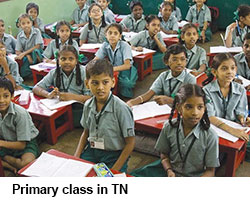Tamil Nadu: Sensible decision
 After sustained criticism from academics and educationists, Tamil Nadu’s AIADMK government has revoked its decision of last September (2019) to conduct public exams for children in classes V and VIII. An estimated 200,000 students statewide in the ten-13 years age group were preparing to write board exams in March-April.
After sustained criticism from academics and educationists, Tamil Nadu’s AIADMK government has revoked its decision of last September (2019) to conduct public exams for children in classes V and VIII. An estimated 200,000 students statewide in the ten-13 years age group were preparing to write board exams in March-April.
In a statement issued on February 4, following a cabinet meeting held the previous day, K.A. Sengottaiyan, minister for school education said: “The government has taken all this (public representations) into consideration and has cancelled the government order to conduct public examinations for classes V and VIII. The existing system of exams will continue.” He added that the normative annual exams administered by school managements will be administered as usual. This withdrawal order is applicable to 45,614 state government, government-aided and 12,419 private schools affiliated with the Tamil Nadu State Board of School Education.
“Parents are heaving a sigh of relief as the state government has withdrawn its decision of conducting board exams for classes V and VIII. Board exams for this age group would have further promoted rote learning culture in primary education. The introduction of rote learning for children from the early years kills all creativity and takes the joy of learning out of millions of children from early childhood. At least pre-teen children should be spared the rigours of cramming for board exams. All right-thinking people welcome the state government’s cancellation of classes V and VIII board exams,” says N. Veeraperuman, general secretary of the Chennai-based Parents’ Welfare Association.
The back story of the almost five-year-old AIADMK government introducing board exams in primary/elementary (classes I-VIII) schools is the provision in several liberal sections of the Right of Children to Free & Compulsory Education (RTE) Act, 2009, legislated by the Congress-led UPA-II government at the Centre in 2009, which became operational on April 2010. Under s.30, all board examinations for children in elementary education are proscribed and s.16 mandates that “no child admitted in a school shall be held back or expelled from school until completion of elementary education”.
Although at the time, the liberal intent of these provisions of the RTE Act was widely welcomed by educationists, the continuous comprehensive evaluation (CCE) testing formula proposed in lieu of examinations has been a comprehensive failure and generated a chorus of demands for introduction of testing in elementary education and revocation of the no-detention (s.16) policy as too many unprepared students were entering secondary education. Therefore in February last year, the BJP government at the Centre re-introduced class VIII exams and revoked the no-detention provision (s.16) in Central government schools. Last September, Tamil Nadu’s AIADMK government (which is pro-BJP) followed suit and introduced class V and VIII board exams.
“The AIADMK government’s decision to introduce two board exams in elementary education was a major over-reaction. Even the website of the Union ministry of human resource development admits that there are no studies to prove that board exams improve children’s learning outcomes. Contemporary education is not about passing exams but developing students’ critical, analytical and thinking skills. This can only happen if classroom teaching-learning is an enjoyable, stimulating journey for children. The state government has done the right thing by revoking its decision to introduce stressful public exams in elementary education,” says Prince Gajendra Babu, former member of the Tamil Nadu State Child Policy Committee (2015-2017) and general secretary of the State Platform for Common School System-Tamil Nadu (SPCSS-TN).
Shivani Chaturvedi (Chennai)















Add comment